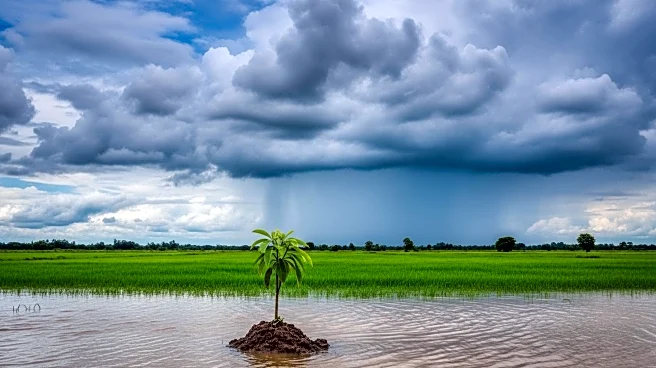What's Happening?
The federal cabinet of Pakistan has declared a climate and agriculture emergency following severe floods that have affected numerous districts, particularly in Punjab. The decision was made during a cabinet meeting chaired by Prime Minister Shehbaz Sharif. A special committee, led by Planning Minister Ahsan Iqbal, has been formed to recommend measures to mitigate the economic impacts of the floods. The government aims to address the challenges posed by climate change and develop strategies to protect the nation from future disasters. The declaration highlights the urgent need for comprehensive climate policies and inter-provincial cooperation.
Why It's Important?
The declaration of a climate and agriculture emergency in Pakistan underscores the immediate and severe impacts of climate change on vulnerable regions. The floods have caused significant human and economic losses, particularly in the agricultural sector, which is crucial for the country's economy. The emergency highlights the need for effective climate adaptation strategies and infrastructure improvements to mitigate future risks. It also emphasizes the importance of international support and collaboration in addressing climate challenges, as developing nations like Pakistan face disproportionate impacts.
What's Next?
The special committee will develop a roadmap to address the impacts of the floods and propose long-term climate adaptation strategies. The government plans to convene a meeting with provincial stakeholders to ensure coordinated efforts in tackling climate challenges. The focus will be on enhancing disaster preparedness, protecting natural resources, and supporting affected communities. The international community may also play a role in providing financial and technical assistance to support Pakistan's climate resilience efforts.
Beyond the Headlines
The emergency declaration raises ethical and social considerations, particularly regarding the responsibility of developed nations to support climate-vulnerable countries. It also highlights the need for inclusive policies that address the needs of marginalized communities affected by climate change. The situation in Pakistan may prompt discussions on the global climate finance architecture and the need for equitable distribution of resources to support adaptation and mitigation efforts in developing regions.









